#turkey-saudi relations
Text
Turkish president welcomes Saudi crown prince with official ceremony
New Post has been published on https://www.timesofocean.com/turkish-president-welcomes-saudi-crown-prince-with-official-ceremony/
Turkish president welcomes Saudi crown prince with official ceremony

Ankara (The Times Groupe)- Saudi Crown Prince Mohammed bin Salman was officially welcomed by Turkish President Recep Tayyip Erdogan on Wednesday in the capital of Ankara.
At the presidential complex, Erdogan received the crown prince.
Prior to an official dinner, the leaders will meet one-on-one and interdelegationally.
During the prince’s official visit, Erdogan said they would discuss ways to boost bilateral ties.
Erdogan visited Saudi Arabia in late April for a two-day working visit.
As part of his visit, Erdogan met with Saudi King Salman bin Abdulaziz Al Saud and the crown prince, and discussed various international, regional, and bilateral issues.
Following his visit to Saudi Arabia, Erdogan said Ankara and Riyadh are determined to work together for regional stability and common interests.
During negotiations with Egypt, Israel, and the United Arab Emirates to normalize relations, Erdogan referred to it as a “new era” for making friends rather than enemies. Turkish Recep Tayyip Erdogan
#Ankara#Egypt#Israel#latest News#Riyadh#Saudi Crown Prince Mohammed bin Salman#Saudi King Salman bin Abdulaziz Al Saud#The Times Groupe#Times#Times Of Ocean#turkey news#turkey-arab nations relations#turkey-israel relations#turkey-saudi relations#Turkish President Recep Tayyip Erdogan#United Arab Emirates#Unravel News#Politics
0 notes
Text
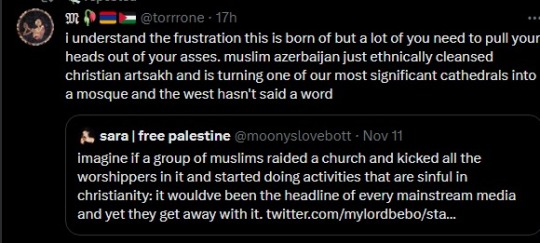
it is imp to remember that this is not about religion and the ethnic cleansing of artsakh proves this. all oppressive regimes are connected regardless of religion and that is why azerbaijan and israel have good relations. another example is saudi arabia having good relations with america and israel while also killing other muslims in yemen.
interestingly, like israel, saudi also uses religion to gain credibility (recently got holy mosque imam to give statement condemning boycotts and encouraging muslims to not be involved in the situation in palestine) and recruit muslim supporters from all over the world, while simultaneously killing/imprisoning muslim critics of the kingdom.
similarly, israel sells itself as a safe haven for jews and convinces jews around the world to migrate to israel while also simultaneously criminalizing antizionist jews all over the world, even suggesting that theyre not 'real jews' (reminiscent of takfirism which is a core part of saudi wahabi ideology) [ fun fact: the house of saud came into power in arabia with help from the british, just like the zionists in palestine! ]
oppressive regimes are directly connected and mirror each other in several ways. this is why liberation and resistance movements need to unite and work together across the world
#as long as u sell ur soul for capitalist profits and empire you will get the support of other colonialist and imperialist countries#regardless of religion#this is also a ksa hate acc btw lol fuck the saudis they should be deposed asap#there is no place for a king in any muslim state#the saudi kingdom has been illegitimate from the very beginning#free palestine#palestine#artsakh#armenian genocide is another example of a musslim ottoman empire committing a enocide against a christian minority#another thing that proves that religion doesnt matter in oppression: the muslim turkish state's treatement of the muslim kurdish minority#look it up!!!#and since all oppressive regimes r connected in one way or another - turkey also has relations with israel#gaza#death to israel#death to america#free kurdistan#uyghurs#kurds#armenians#free kashmir#india's treatment of kashmir and link that to india's support for israel#china may be somewhat opposed to israel or america but that does not absolve china's ethnic cleansing of uyghurs#east turkistan#east turkistan independence day is today btw!!
315 notes
·
View notes
Text
how do you stay hopeful when every powerful force is against you, and mainstream media yields to their wants and needs, when every step forward is met with brutalisation forcing you 10 steps back, and sympathy is only extended to the oppressor
#I am feeling completely hopeless. and miserable.#it just feels like no matter how many people support palestine we won’t ever see genuine action and change#bc Israel is back by the US and the UK and so many other global actors and superpowers#plus Saudi wants to normalise relations with them and Turkey practically has#so it’s like. yeah power to the people but what can we DO#what will we actually achieve#and this is by no means my giving up or accepting ‘defeat’#but it’s just so constant#it feels like there’s no winning and I can’t even begin o conceptualise how horrifying for Palestinians themselves#and I’ve been going to protests and demonstrations since I was a kid with my parents#and it’s so obvious our governments do not care. and will never succumb#they’re not for us. they don’t care about us. nothing we do or say matters#we protested the Iraq war and they still bombed it. we protested against the way on Syria and still they bombed it#it just feels like we have no voice. no say. no opinion#this is a terrible rant. I just feel tired. and it’s sad I can say that and go on with my life when my fellow people can’t#rahma’s rambles#free palestine#palestine
7 notes
·
View notes
Text
The Grand Theatre of Absurdities: A Satirical Glance at the Middle-Eastern Melodrama
In the grand narrative of human history, few scripts have been as tirelessly rewritten, with as much fervor and as little resolution, as the Middle-Eastern conflict. The latest act in this ongoing drama features a cast of characters as predictable as a sitcom lineup, with plot twists that would make Shakespeare’s ghosts yawn in their ethereal slumbers.Let’s set the stage: The IDF, with the…
youtube
View On WordPress
#2023#Aid#Arab States#Ceasefire#conflict#Geopolitics#Global-Politics#Hamas#humanitarian#IDF#Indo-Israel-Relations#Information-Warfare#Iran#Israel-Palestine#Jordan#Middle-East#Political-Satire#Saudi Arabia#Turkey#United-Nations#Youtube
0 notes
Text
How Turkey and Saudi Arabia became frenemies – and why the Khashoggi case could change that
Things between Saudi King Salman and Turkish President Erdogan have become rather tense.
AP Photo/Burhan Ozbilici
Nader Habibi, Brandeis University
The Oct. 2 disappearance of Saudi Arabian journalist Jamal Khashoggi at his country’s consulate in Istanbul has put a spotlight on the deteriorating relations between Turkey and the Persian Gulf kingdom.
Articles based on anonymous accounts from…
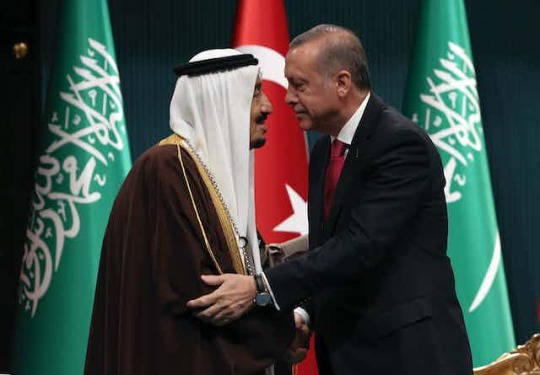
View On WordPress
#Corepaedia#corepaedianews#International relations#Istanbul#Jamal Khashoggi#Middle East#Mohammad bin Salman#Recep Tayyip Erdoğan#Saudi Arabia#Trump administration#Turkey#US-Saudi relations#US-Turkey relations#كوربيديا#كوربيديا للاخبار
0 notes
Text
Palestine related news summary from LetsTalkPalestine, May 1 to May 4, 2024.
[Ways to help, sources, and more: LetsTalkPalestine Linktree]
May 1.
(Instagram reel of UCLA protest. Includes footage of treating n washing a pro-palestine protestors' bloody head)
Day 208
🇨🇴 Colombia to cut diplomatic ties w/ Israel
• 33 killed, 57 injured in the last 24 hours. Real number likely higher
⚖️ US lobbying ICC not to issue arrest warrants for senior Israeli officials, after Israel's threat to respond by retaliating against Palestinian Authority for sparking ICC investigation
🇫🇷 France denies selling weapons to Israel used in Gaza, claiming what's sold will be re-exported to 3rd countries via Israel, but did supply Israeli Iron Dome defense system
🇹🇷 Turkey set to follow Columbia & Nicaragua by joining South Africa's ICJ case against Israel
🎓 Zionist mob attacked Palestine protestors at UCLA w/ fireworks & pepper spray for 3 hours, police didn’t intervene (📹👆). Columbia & CUNY asked NYPD to raid & arrest 280+ student protestors. New encampments across UK, Tunisia & Canada
🚚 First aid trucks enter through Beit Hanoon crossing to north Gaza despite Israel's promise to open 1 month ago. Nearly half of aid convoys to north Gaza denied by Israel.
May 2.
(Instagram post, news update. The Israeli occupation has killed Palestinian Dr. Adnan Al-Barash.)
Day 209
• 28 Palestinians killed, 51 injured in last 24 hours. Note that the toll is underreported.
🏥 Dr. Adnan al Barash killed in captivity after IOF abducted him in Dec (📷👆)— 496 medical personnel killed in Gaza + 309 in captivity
🇸🇦 Saudi Arabia arrests many for anti-Israel online posts, incl. an executive & media figure. Timing suspicious w/ reports of renewed normalization talks
• IOF attacks aid convoy, killing 1
🇹🇷 Turkey stops all trade w/ Israel after banning 54 exports to Israel
🇺🇸 US House pass “antisemitism awareness” bill using repressive IHRA definition of antisemitism despite antisemitism covered in anti-discrimination law. Why is IHRA definition problematic? See tinyurl.com/ynsfy8sx
• IOF airstrike in central Gaza killed 5, incl. a child
🪨 37m tons of rubble in Gaza, heavy contamination w/ unexploded ammunition & 800,000 tons of asbestos
🎓 Columbia & Emory University face federal investigation for anti-Muslim discrimination, reports of doxing & harassment
May 3.
Day 210
• World Press Freedom Day: Israel killed 100+ journalists since Oct 7 + holding 53 captive
• 26 killed, 51 injured in the last 24 hours. Note the toll is underreported.
• Israel attack on Rafah killed 7, incl. a mother & her children — the children’s bodies were shredded by the airstrikes
🇹🇹 Trinidad & Tobago recognizes the State of Palestine as West Bank & Gaza
🇬🇧 UK sanctions 2 Israeli groups + 4 settlers for violence in West Bank, warns of more sanctions if no Israeli action against settler attacks
• Israeli strike on Bureij camp killed 5, incl. a child
💰 UN estimates cost to rebuild Gaza at $40bn; more than post-WWII reconstruction
🎓 Goldsmiths University students in London win & obtain demands after occupying library — @ goldsmithsforpalestine on instagram for details
🎓 University encampments for Gaza go global spreading to 🇨🇦 🇮🇳 🇳🇿 🇪🇸 🇦🇷 🇯🇵 🇰🇼 🇱🇧 🇹🇳 🇯🇴. US crackdown w/ 2,200 students arrested
• Iran-backed Bahraini militia launches attack at southern Israeli port Eilat
May 4.
Day 211
✝️ Israel blocks entry of many Palestinian Christians to Jerusalem for Holy Saturday celebrations
• 32 Palestinians killed, 41 injured in Gaza in last 24 hours. Toll underreported
• IOF killed 5+ in 15-hour siege on Tulkarem (West Bank) & clashes with Hamas resistance fighters. IOF targeted fighters’ homes w/ women & kids inside, demolished homes trapping many under rubble
• Israeli strikes on Gaza kill 11 incl. 3 in bombings of tents in Rafah
• Head of UN WFP says north Gaza experiencing “full-blown famine” and it’s only a matter of time before south Gaza faces same level of starvation
🇫🇷 British-Palestinian @ dr.ghassan.as denied entry to France for Senate address as witness of Gaza Genocide as Germany put year-long ban on his entry to Europe (Schengen)
🇺🇸 88 US lawmakers warn Biden that Israeli aid blockade violates US ‘foreign assistance’ law
• IOF abducts 5 overnight in West Bank
🎓 Uni encampments spread to Switzerland, Ireland, Germany, Cuba & Costa Rica
388 notes
·
View notes
Text
by Robert Williams
To assess correctly the damage that Qatari influence in the US is causing, it is essential to understand what Qatar stands for and promotes. Qatar has for decades cultivated a close relationship with the Islamist Muslim Brotherhood, whose motto is: “‘Allah is our objective; the Prophet is our leader; the Quran is our law; Jihad is our way; dying in the way of Allah is our highest hope.” It aims to ensure that Islamic law, Sharia, governs all countries and all matters.
Hamas, an offshoot of the Muslim Brotherhood, has enjoyed Qatar as its main sponsor, to the tune of up to $360 million a year, and was until recently the home of Hamas’ leadership. In 2012, Ismail Haniyeh, head of the terrorist group’s political bureau, Mousa Abu Marzook, and Khaled Mashaal, among others, moved to Qatar for a life of luxury. This month, likely because of Israel’s announcement that it will hunt down and eliminate Hamas leaders in Qatar and Turkey, the Qatar-based Hamas officials reportedly fled to other countries.
Qatar was also home to Sheikh Yusuf al-Qaradawi, the spiritual leader of the Muslim Brotherhood, who was exiled from Egypt until his death in September 2022. According to the Meir Amit Intelligence and Terrorism Information Center:
💬 “Qaradawi is mainly known as the key figure in shaping the concept of violent jihad and the one who allowed carrying out terror attacks, including suicide bombing attacks, against Israeli citizens, the US forces in Iraq, and some of the Arab regimes. Because of that, he was banned from entering Western countries and some Arab countries…. In 1999, he was banned from entering the USA. In 2009, he was banned from entering Britain…”
Qaradawi also founded many radical Islamist organizations which are funded by Qatar. These include the International Union of Muslim Scholars, which released a statement that called the October 7 massacre perpetrated by Hamas against communities in southern Israel an “effective” and “mandatory development of legitimate resistance” and said that Muslims have a religious duty to support their brothers and sisters “throughout all of Palestine, especially in Al-Aqsa, Jerusalem, and Gaza.”
Qatar is still home to the lavishly-funded television network Al Jazeera, founded in 1996 by Qatar’s Emir, Sheikh Hamad ibn Khalifa Al Thani. Called the “mouthpiece of the Muslim Brotherhood,” Al Jazeera began the violent “Arab Spring,” which “brought the return of autocratic rulers.”
In 2017, Saudi Arabia, the United Arab Emirates, Bahrain, and Egypt made 13 demands of Qatar: “to cut off relations with Iran, shutter Al Jazeera, and stop granting Qatari citizenship to other countries’ exiled oppositionists.” They subsequently cut ties with Qatar over its failure to agree to any of the demands, including ending its support for terrorism, the Muslim Brotherhood, and Al Jazeera.
The Saudi state-run news agency SPA said at the time:
💬 “[Qatar] embraces multiple terrorist and sectarian groups aimed at disturbing stability in the region, including the Muslim Brotherhood, ISIS [Islamic State] and al-Qaeda, and promotes the message and schemes of these groups through their media constantly,”
US universities and colleges are happy to see this kind of influence on their campuses in exchange for billions of dollars in Qatari donations. According to ISGAP:
💬 “[F]oreign donations from Qatar, especially, have had a substantial impact on fomenting growing levels of antisemitic discourse and campus politics at US universities, as well as growing support for anti-democratic values within these institutions of higher education.”
#qatar#american universities#ivy league#ivy league schools#foreign influence#muslim brotherhood#yusef qaradawi
35 notes
·
View notes
Text
SUMMARY Tuesday Israel Realtime
🔻no overnight rockets / drones
▪️HOSTAGE CEASEFIRE LEAKS.. “the head of the Mossad continued the meetings in Qatar during the night and plans to return to Israel today. The negotiations have officially started and “there is a solid basis for starting talks”. High level of Mossad, Shin Bet and IDF work teams are deployed in Qatar.”
All reported demands are OUTRAGEOUS, EXTREME, war loss type of demands.
▪️BIDEN SAYS.. on his Twitter account: "Today I spoke again with Prime Minister Netanyahu regarding the latest developments in Israel and Gaza. I continued to confirm that Israel has the right to persecute Hamas, the terrorist group responsible for the worst massacre of the Jewish people since the Holocaust.
I reiterated the need for an immediate ceasefire as part of a deal to release the hostages, which will last several weeks, so that we can return them home and help the citizens in Gaza. I asked the Prime Minister to send a team to Washington to discuss ways to fight Hamas without a major ground operation in Rafah"
🔸GAZA.. the new battle for al-Shifa hospital, which was re-taken by Hamas as a command and control site, shows the IDF has a humanitarian problem - Hamas is consistently hiding in maximum civilian casualty sites, and a control problem, it appears they are taking and smashing but not occupying.
While the Prime Minister announced Israel WILL go into Rafah, we also hear “a few weeks of preparation” while at the same time the U.S. is demanding approval rights on the approach, to make sure Hamas’s human shields are kept safe while Israeli hostages continue to rot.
The US, via various unspoken and now spoken threats, is effectively stopping Israel in Gaza.
🔸LEBANON.. tit-for-tat attacks continue. The Lebanese now report 90,000 evacuated civilians, and around 400 dead, with about 4 of 5 being Hezbollah fighters - an incredible targeting success although perhaps too discriminate?
Hezbollah continues a gradual use of bigger weapons, and the IDF continues large bomb attacks. But in both cases staying on mostly military targets and within short range of the border.
🔸YEMEN.. Houthis continue daily shipping attacks, most miss, some interceptions by US/UK ships. The Indian navy has helped several hit ships. The Houthis admitted the Iranian navy ship is feeding them targeting data, the Iranians deny.
US / UK bombings are basically ineffective, with them reporting “11 attacks, we took out 3 missiles”.
Saudi bombed the Houthis, not related to shipping, and the UAE announced the formation of a foreign legion / mercenary force to fight the Houthis in Yemen.
🔸JERUSALEM.. with tens of thousands of nightly worshippers, the Temple Mount compound has been kept controlled so far through Ramadan. There were a few attempts at riling up the Arab public via propaganda, such as “they’re installing blocking gates!” which were actually replacing of rotted out police control fences.
🔸JUDEA-SAMARA (West Bank).. the IDF continues a high volume of nightly counter-terrorism raids and arrests. However, there are also several daily attacks on the roads, shootings into towns, stabbings at checkpoints.
🔸SYRIA.. Israel bombs regularly sites where Iran is stocking weapons headed towards Hezbollah. But Iran continues to ship in weapons AND fighters.
US bases in Syria have NOT come under attack since the US asked Iran nicely to stop it (and released to them $10 billion).
Turkey is now attacking northern Syria, where they have a Kurdish rebel cross border problem, and has committed to eliminating the problem and taking control of a security zone.
14 notes
·
View notes
Text
Across the globe, a diverse group of nations that view world politics differently from the United States are rising and flexing their diplomatic muscle in ways that are complicating American statecraft. From Africa to Latin America, to the Middle East and Asia, these emerging powers refuse to fit into traditional U.S. thinking about the world order. The successful pursuit of American interests in the mid-21st century calls for a strategy that attracts them toward the United States and its ideals but without expecting them to line up in lockstep with Washington.
“We refuse to be a pawn in a new cold war,” Indonesian President Joko Widodo, known as Jokowi, said in November 2022. His views are shared in some form or another by leaders of Argentina, Brazil, India, Mexico, Nigeria, Saudi Arabia, South Africa, Thailand, and Turkey. All 10 of these nations are either in the G-20 or have economies large enough to warrant membership. A majority of them have populations larger than Germany’s. Collectively, they make up around a third of the world’s population and a fifth of its economic production, while also constituting a major share of the so-called global south’s population and economic production.
In the next two decades, emerging powers like these will climb the ranks of the world’s largest economies and populations, reshaping the structure of world politics in the process. Their diplomacy is increasingly ambitious. And they are taking positions that run counter to those of the United States with growing boldness. Washington and its allies should accept not only that these powers are emerging, but also that as they grow stronger, they will not align with Washington’s preferences on many international issues, especially when it comes to Russia and China.
When Russia invaded Ukraine in February 2022, most of these powers declined to join the U.S.-led coalition to support Ukraine, refusing to take concrete action with sanctions on Russia or weapons for Kyiv. Some emerging powers, such as India and Turkey, even expanded economic ties with Russia.
Meanwhile, several of them pursued active diplomacy to end the war, challenging the U.S. policy of supporting Ukraine “as long as it takes.” Brazilian President Luiz Inácio Lula da Silva, for example, pitched a plan to assemble a peace club to end the war and urged Washington to “stop encouraging war and start talking about peace.” Separately, Jokowi visited Kyiv and then Moscow, urging Ukrainian President Volodymyr Zelensky and Russian President Vladimir Putin to start a dialogue. South Africa led a delegation of African leaders to end the war, and Turkish President Recep Tayyip Erdogan has maintained a working relationship with Putin and sought to keep diplomatic channels open.
Most of these emerging powers also have warm ties with Beijing. They are reluctant to do anything that would endanger their economic relations with China. On a visit to Beijing in 2023, for example, Lula pledged to work with China to “balance world geopolitics”—a phrase that implied upending American global primacy. Even India, which sees China as an adversary and has grown much closer to the United States in recent years, is very unlikely to back the United States militarily in the event of a war over Taiwan.
Washington thus needs to avoid the urge to frame this world historical moment as a neo-Cold War ideological struggle. When the United States appeals to the emerging powers to sacrifice their interests for the liberal world order, they suspect that it is simply trying to woo them for its hard-power struggles with Russia and China. Their officials are quick to cite the 2003 Iraq War as evidence that Washington is not so committed as it claims to the liberal international order. They point to the many cases where the United States has compromised on its high principles and backed autocrats. President Joe Biden’s support for Israel’s campaign in Gaza has only given them another reason to doubt the veracity of American claims to exceptional moral authority.
Most of these emerging powers have limited political headroom anyway for ideological struggles of the kind that so often animate U.S. foreign policy. Indian Foreign Minister S. Jaishankar drove this point home when he pointed out that Europe’s ability to wean itself from Russian energy was a luxury that India did not have. “I have a population at $2,000 [per capita annual income],” he said. “I also need energy, and I am not in a position to pay high prices for oil.”
Given frictions between Washington and so many emerging powers of late, it can be tempting to disregard them and focus solely on countering Beijing and Moscow. But this would be a mistake. The emerging powers don’t pose a threat of the kind that U.S. adversaries can, but they also can’t just be ignored. China and Russia are certainly not going to ignore them—in fact, they are actively courting their leaders for political ties and market access with the hope of building a network of political and economic partners to obviate the need for ties to the West.
The emerging powers are also very open to China’s backing for alternative international institutions, such as the BRICS New Development Bank, that offer the prospect of infusions of capital without the bothersome conditions that accompany Western loans. They are critical of many aspects of the U.S.-led international order, which they see as dominated by former colonial powers and unfairly structured to serve the interests of the world’s wealthiest nations.
The good news for Washington is that the emerging powers don’t want to be vassals of China any more than they want to be vassals of America. They are not swing states ready to pick sides in a neo-Cold War. In fact, they actively seek a more fluid and multipolar world, one in which they believe they will have more leverage and freedom of maneuver. Many, moreover, maintain closer economic ties with the United States than China, especially when it comes to investment and defense cooperation.
Washington can make progress with these powers if it puts aside grand ideological framings about the liberal world order and focuses on developing a positive value proposition that offers meaningful benefit to their economic and political development, sovereignty, and aspirations for an enhanced voice in international affairs.
Although trade agreements have become politically unpopular for Republicans and Democrats alike, market access remains a powerful tool the United States has to this end. Other mutually beneficial economic arrangements are imaginable, focused on specific sectors and packages. So is cooperation on infrastructure investments, technology manufacturing, energy transition initiatives, deforestation, public health, and other areas.
Even when making progress on common interests, the emerging powers will also maintain substantial relationships with U.S. adversaries. Washington should not fall into the trap of judging the quality of its relations with the emerging powers by the strength of their ties to China or Russia.
Ultimately, the best way to engage with these nations is to help them strengthen their sovereignty so that they can resist the influence of U.S. adversaries and gain a real stake in sustaining a peaceful world order. This will take time and a change of approach but is likely to pay long-term benefits to America’s prosperity and continued global leadership.
7 notes
·
View notes
Text
The Iranian state’s radical form of Islam is being challenged by intensifying leftist struggles against religious domination as a force of reaction and an obstacle toward achieving liberatory goals. To counter this, the Iranian state has devoted its immense resources toward shaping and influencing the understandings and positions of western leftists and so-called anti-imperialists in relation to itself. They are able to take advantage of lobbying efforts such as NIAC (National Iranian American Council) to spread their propaganda and influence among leftists and intellectuals in the West. This has allowed to the Iranian state to largely insulate itself from scrutiny and criticisms for its imperialist policies on the international stage. These efforts have been effective to such a degree that when imperialism is spoken of, it’s broadly understood to only concern the actions of the United States
Despite the prevalence of this US-centric view of imperialism, Western and Eastern states such as Russia, China, the United Kingdom, Saudi Arabia, Iran, Turkey, and others aggressively act on their own imperialist aspirations and interests regionally, and often work in tandem with US imperialism to plunder resources and impose their own forms of brutal military and political control. The events of the past decade in the Middle East provide clear and ample evidence for this analysis
The US created the conditions for Daesh and then then Turkey unleashed them on the region to repress the revolutions of the Arab spring and protect their own imperialist interests. The presence of Daesh has allowed the Iranian state to pursue its own form of Shia imperialism in Syria, Iraq, and other countries. Our position on “imperialism” is fundamentally at odds with that of the duped and brainwashed anti-imperialist Western left (and east). In our view, “imperialism” is imperialism regardless of who perpetrates it, and there are no good or justifiable forms of imperialism
64 notes
·
View notes
Text
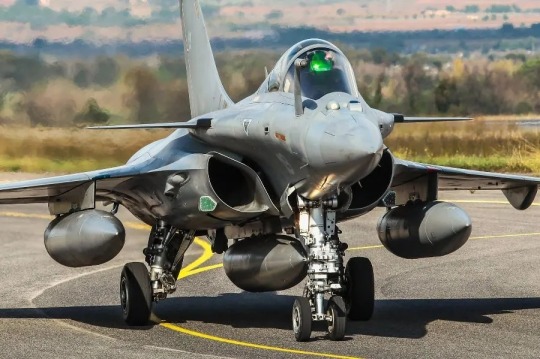
After the German embargo on Eurofighters, Saudis now target Rafale fighters
Fernando Valduga By Fernando Valduga 08/22/2023 - 18:45 in Military
Saudi Arabia has its eye on the French-made Rafale fighter, after its long wait for the Eurofighter proved to be useless due to Germany's reluctance to export weapons to the country.
According to French media reports, the kingdom is considering acquiring 100 to 200 Rafale combat jets.
According to the French newspaper "La Tribune", in addition to acquiring the 100-200 Rafale fighters, Saudi Arabia wants to participate in the joint European program to develop a new FCAS fighter.
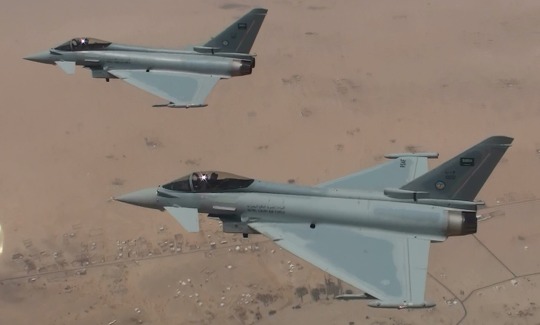
However, the French newspaper reports that "the signing of a contract is still very hypothetical".
Germany announced in July that it would not allow the delivery of new Eurofighter Typhoon jets to Saudi Arabia. The 72 Eurofighters of the Saudi Air Force are the second most numerous type of fighter, behind the Boeing F-15 manufactured in the USA.
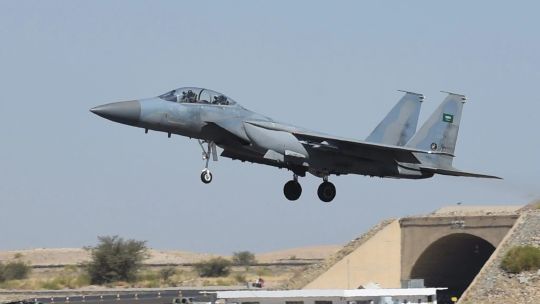
The largest fleet of fighters in Saudi Arabia is the F-15.
The change could have irritated the United Kingdom, which hoped to deliver 48 jets of the type to Saudi Arabia, whose contract was awarded to BAE Systems five years ago.
The export of weapons to Saudi Arabia was blocked by Germany after the murder of Saudi journalist Jamal Khashoggi inside the Saudi consulate in Istanbul, Turkey, in 2018, taking a much tougher approach than the main allies such as the US, France and Great Britain.
Saudi Arabia's participation in the Yemen war was also cited as the reason for the blockade. The pressure from the business-friendly Free Democratic Party (FDP) has been increasing to reconsider the position after Saudi Arabia reached a ceasefire with the Iran-backed Houthis in Yemen last year.

FCAS concept.
Still on the FCAS, the Saudis are not interested in a contract, but in a partnership. In addition, according to La Tribune, Saudi Arabia would consider participating in the European aircraft project of the future if the agreement with Germany failed.
Tags: GermanyMilitary AviationDassault RafaleEurofighter TyphoonRSAF - Royal Saudi Air Force/Royal Saudi Air Force
Sharing
tweet
Fernando Valduga
Fernando Valduga
Aviation photographer and pilot since 1992, has participated in several events and air operations, such as Cruzex, AirVenture, Daytona Airshow and FIDAE. He has works published in specialized aviation magazines in Brazil and abroad. Uses Canon equipment during his photographic work around the world of aviation.
Related news
HELICOPTERS
U.S. Army grants contract to Airbus for helicopter modernization
22/08/2023 - 16:00
MILITARY
Netherlands increases order for General Atomics MQ-9A Reaper drones
22/08/2023 - 14:00
The conceptual image of the military version of the Next Generation Amphibious Aircraft (NGAA) Catalina II turboprop amphibious aircraft of the American company Catalina Aircraft. (Photo: Catalina Aircraft)
MILITARY
U.S. company wants to revive Catalina project for military missions
22/08/2023 - 12:00
MILITARY
Russian supersonic bomber was destroyed by alleged drone attack from Ukraine
22/08/2023 - 10:00
MILITARY
Indonesia commits to acquire Boeing F-15EX fighter jets
22/08/2023 - 09:00
HELICOPTERS
U.S. approves sale of 96 AH-64E Apache helicopters to Poland
22/08/2023 - 08:00
9 notes
·
View notes
Text
Attention, this is not a joke but a killing joke,
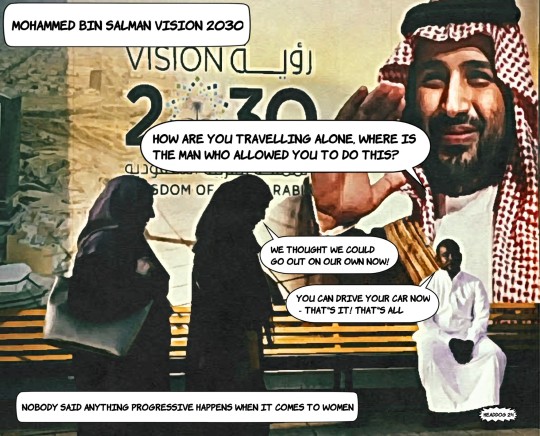
Saudi Arabia takes over chairmanship of UN Commission on the Status of Women - human rights activists appalled.
Louis Charbonneau of Human Rights Watch made it clear on X (formerly Twitter): "Saudi Arabia's election to head the UN Commission on the Status of Women shows a shocking disregard for women's rights everywhere." A country that already imprisons women for fighting for women's rights has no right to such a post, Charbonneau continued.
He also criticised the other countries in the Commission for not preventing the change. "If everyone had stood up straight, this wouldn't have happened. But everyone kept quiet."
How can something like this go so wrong?
Abdulaziz Alwasil, Saudi Arabia's UN envoy, will be the chairman. According to the Guardian, none of the envoys from 45 countries raised any objections to his nomination at the CSW's annual meeting. There were also no opposing candidates.
The Philippines actually held the chairmanship for two years. However, other members from Asia had urged the country to hand over the seat after one year. Bangladesh had actually been intended as the successor, but instead Saudi Arabia pushed its way to the top with a lot of lobbying.
Let's put it plainly: everyone has let themselves be bought by a world of greed and corruption! That's what the nice, generous Saudis love. They simply buy influence and culture, football, golf, ...... pukes sorry
Saudi Arabia is trying to polish up its image to the outside world with reforms such as allowing women to drive.
What a charade, makeup on the ugly face of the unjust state.
Hooray, the goat has been declared a garden.
And they are about to prove to the saudis what they think of women's rights.
Completely nothing
Case: Manahil al-Utaibi
Fitness trainer faces eleven years in prison in Saudi Arabia
There have been some makeup reforms in Saudi Arabia recently. The country wants to appear cosmopolitan. At the same time, critics are silenced with long prison sentences. The case of a young fitness trainer is apparently no exception.
According to human rights activists, a female activist in Saudi Arabia has been sentenced to eleven years in prison for her choice of clothing and support for women's rights. Manahil al-Utaibi was sentenced in January - more than a year after her arrest - by a special court for terrorism, the organisation Amnesty International announced on Tuesday evening.
The accusations against the 29-year-old fitness trainer related to her clothing and her calls on social networks to end the male guardianship system in the kingdom. She had also published videos of herself without the traditional Abaja overdress.
Saudi Arabia's government confirmed the arrest in December following an enquiry into the case by a UN special rapporteur. Al-Utaibi had been convicted of "terror offences", it said. The country's laws would protect the right to freedom of expression unless actions could "violate or exceed the limits of public order or social norms".
The last sentence immediately made us think of George Orwell! Freedom of expression with limits is good!
Amnesty International and the human rights organisation ALQST urged the kingdom to release Al-Utaibi immediately and unconditionally. According to them, she was physically and psychologically abused in detention following her arrest in November 2022. In addition, she was held in an unknown location for several months.
Well, chairmanship of UN Commission on the Status of Women
How is the status of Al-Utaibi ?
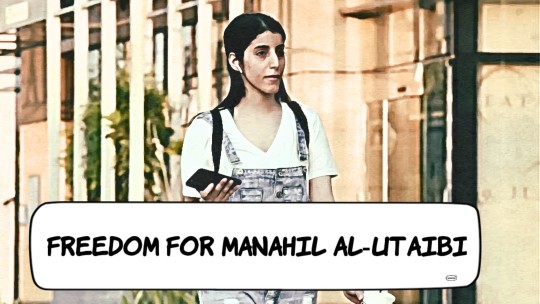
One of the representatives of nice Mohammed bin Salman, who simply had a journalist killed and dismembered in Turkey.
Shit, nobody would believe that in a novel, if you want to write a novel like that at all.
The new human injustice game for women's rights only. Now new from the nice grinning man who rules Saudi Arabia.
Saudi Arabia rights vs women's rights
The New Game
There is only one dice with over all one on it for the women
A stack of cards with a card for women on it say go to jail for a long time and lose your wife and even your bonus human rights.
The Saudis always have one more bonus card when they need it where it says we always win.
A board of politicians, police, special courts, torturers, prison and just an absolute terrorist suspect wife.
Start of the game: The woman catches and does something really stupid she thinks she's women right, and Saudi Arabia wins.
Game idea from the makers I have a journalist killed in Turkey and nobody can catch me : Moammed bin Salman.
#chairmanship of UN Commission on the Status of Women#this is a joke#or not#Manahil al-Utaibi#freedom for Manahil al-Utaibi#uno fail#Louis Charbonneau#human rights watch#greed and corruption#saudi arabie#women rights#freedom of expression#equal pay#equal justice#equality#freedom of speech#free speech#free art#freedom#headdog#artwork#satire#reality#Amnesty International#ALQST#save our democracy#killing joke#save our souls#female activist#mohammed bin salman
4 notes
·
View notes
Text
A Jihad for Love (2008)


Director - Parvez Sharma
Producer - Sandi Simcha Dubowski
Cinematography - Parvez Sharma, Berke Baş,David W. Leitner
Writer - Javed Haider Zaidi
Cast - Imam Muhsin Hendricks,Arsham Parsi,Maryam,Abdellah,Mazen,Ferda,Qasim,Ahsan,Amir,Mojtaba,Kiymet,Sana,Maha,Pedram Abdi (Payam)
Languages - Arabic,Farsi,Urdu,Bengali, Hindi,English,French,German,English,Turkish,etc
Genre - •LGBTQ •Islam •Documentary
Year of Release - 21 May,2008
Box office - $105,651
Awards - •Best Documentary Award,MIX BRASIL •Best Documentary, Image+Nation Film Festival •Best Documentary,The Tri-Continental Film Festival,India • GLAAD Media Award •Teddy Award,etc
A Jihad for Love (preceded by a short film called In the Name of Allah) is an award-winning international documentary on Homosexuality & Islam.It took total six years to make this groundbreaking documentary.Parvez Sharma took the risk to film this documentary in most dangerous country (like Islamic Republic of Iran,Iraq, Saudi Arabia,Pakistan,Egypt).Homosexuality is a punishable crime in most Muslim World.
The work that Sharma started with this film has become a staple in many books on Islam and at U.S. University libraries.The website Faith in Equality put it at number 9 in a list of LGBT films about faith.IMDb rates the film at 13 on its list of 58 titles under the category of "Best documentaries on religion, spirituality & cults".The film first premiered at the TIFF in 2007, and has been screened to great acclaim at several film festivals around the world.The film went on to win 15 other international awards.
Plot
At starting it shows a glimpse of Islam across the globe.The film first featured Hendrick Muhsin, a South African,Pakistani Gay & Muslim.He is also the first Out Gay Imam of Africa.Filmmaker Parvez got into the deep of Hendicks's personal life struggles,his understanding of Islam & reconciliation of intersecting identities.
Mazen, an Egyptian effeminate muslim was arrested in 2001, in a gay nightclub named Queen Boat.He was beaten,forced to stand trial twice on "debauchery" charges & sentenced to a total of 4 years in prison, where he was raped.He eventually moved to Paris.Mazen also has left his families & friends in Egypt.
Sana is a Black Lesbian refugee, & a victim of FGM.She has a deeper understanding of Islam & told Parvez that Queerness is not against Islam.Sana didn't have any kind of sexual relation with any women.But she had intimate loving relations with women.Like others, she came to France as a refugee.Sana befriend with Maryam & Mazen.
Maryam is Moroccan-born queer womxn who lives in Paris.Her girlfriend Maha lives in Egypt.Both lovers met each other on Bint-al Nas - a meeting site for Arab LBTQ womxn.Maryam still believes that she deserves punishment for her lesbian sexual relationship.Both have survived abusive marriages and can only share their love for each other in private.Maryam & Maha go on a shared journey of search and discovery of female homosexuality.In Al-Azhar, they discover an old bookstore where they find a copy of the Fiqh al-Sunnah(The Laws of the Prophet).In the heart of an ancient mosque in the Citadel,they discover beautiful Islamic calligraphy as they declare their impossible love for each other.

Amir, an Iranian gay shia who has respect for Imam Hosseini.He sacrificed his life for Allah & reconciling his muslim faith.While in Iran, he was persecuted under the charges of illicit sexual conduct,illicit mannerism & received 100 lashes.After being brutally beaten and tortured in the police custody.The judge also threatened Amir that he should be punished by stoning.However he was sentenced to flogging.He told Sharma that Allah helped him to escape this traumatic situation.He fled to Turkey as soon as well.There he met 3 gay refugees - Arsham,Payam,Mojtaba.Mojtaba, another (Persian) gay muslim who ran away from Iran,due to his same sex marriage ceremony in 2005.
Ferda & Kiymet are a happy couple in Turkiye.Kiymet belongs from a conservative family.In her early Kiymet's marriage was fixed with a man.Kiymet's marriage ended up at divorce.Then she found Ferda, her soulmate.Ferda's mom is very supportive & tolerant of sexuality.Ferda is a devout sufi queer muslim, who honors Rumi - a prominent sufi icon for both LGBTQ+ & Straight Muslims.
Ahsan & Qasim are queer platonic friends.Ahsan is a Sunni Muslim & Qasim is a Shia Muslim.Both men, belongs from poor backgrounds do not adopt the western peronae of ‘gay’ and instead rely on vernacular terms.Ahsan & Qasim are part of transvestite,transgender community called Zenana,Kothi in Northern India.Most of these community hide themselves from public.Ahsan,Qasim find a safe space in his community.While Qasim is struggling with his sexuality in heteronormative society.
The filmmaker also documented the diverse tolerance of sexuality in sufi traditions (Pakistan,India & Turkey).
Is it the first film on Islam & Homosexuality?
''A Jihad for Love'' is called world's 1st film on Islam & Homosexuality.A Jihad for Love would be an international feature documentary film rather than world's first film on LGBT muslims.However there are several films that focused on LGBTQ muslim or Queerness in Islam.For Example:
Road to Love (2001)
Act of Faith (2002)
Haremde dört kadin (1965)
Hammam al-Malatily (1973)
Köçek (1975)
Ihtiras Firtinasi (1984)
My Beautiful Laundrette (1985)
Marcides (1993)
Istanbul Beneath My Wings (1996)
Hamam (1997)
Lola & Billy the Kid (1999)
Production
Bismillah (In the name of Allah) was considered as an early working title for this documentary.Among muslims,the word Bismillah is very auspicious & used before beginning actions,speech,writing.But the tittle was not considered as the final title of this film due to controversy.
A Jihad for Love is produced by Halal Films, in association with the Sundance Documentary Film Fund,Channel 4 (UK),ZDF (Germany),Arte (France-Germany),Logo (US) & SBS Australia.The director & producer Parvez Sharma & co-producer Sandi Dubowski raised more than a million dollars over a 6 years period to make the film.
In an interview with The NY Times,Parvez Sharma said that he "would shoot touristy footage on the first 15 minutes & the last 15 minutes of a tape", with interviews for documentary in between, to avoid having his footage seized at customs.He compiled 400 hours of footage from a dozen countries ranging from Iraq to Pakistan to the UK.The nature of the work placed him at considerable personal risk.He adopted hardcore guerrilla film-making tactics,pretending to be a tourist in one country,a worker for an AIDS charity in another country.Wherever he went,he asked his queer friends to keep copies of footage and destroy the tapes once he had successfully smuggled the masters out of the country.
During his filmmaking Parvez traveled several countries including Pakistan, Iraq, India, Bangladesh, Egypt, USA, UK, Turkey, France, Saudi Arabia, South Africa,[...].
Interviews
In an interview with NY Times magazine,Parvez Sharma said,"Being gay and Muslim myself,I knew that this film had to be about us all coming out— as Muslims. It's about claiming the Islam that has been denied to us." With a target audience of "faithful Muslims," he undertook a variety of outreach tactics, including leafleting mosques,blanketing MySpace,screening in Astoria for 15 key progressive Muslim leaders.In an interview to Der Spiegel, Sharma explained the significance of the title: "I'm not looking at jihad as battle.I'm looking at the greater jihad in Islam, which is the jihad as the struggle with the self.I also thought it was really compelling to take a word that only has one connotation for most -- to take that, reclaim it and put it in the same phrase as love,which is universal.I really think it explains it very well.
Film Screening
A Jihad for Love first premiered in Toronto International Film Festival(TIFF) in September 2007.At its premier,the director was given a security guard for safety reasons.After this film festival A Jihad for Love got huge applaud internationally.A Jihad for Love film premiered as the opening film of Panorama Documente of the Berlin Film Festival in February 2008.
The film was screened in The Rio Film Festival,Brazil on September 2007,Morelia Film Festival,Mexico, on October 2007,The Sheffield DocFest on November 2007,London Gay & Lesbian Film Festival on March 2008,Melbourne International Film Festival on July 2008,Thessaloniki Documentary Film Festival on March 2008,etc.A Jihad for Love's first premier in African continent was The Out in Africa Film Festival in Johannesburg and Cape Town,November 2007. On April,2008 A Jihad for Love film was successfully screened at Istanbul International Film Festival.It was the first time that the film allowed to screen in a muslim-majority country.Film also screened in Q! Film Festival of Indonesia.Although singapore banned the film from festival in 2008 due to its sensitive subject.
Popularity
A Jihad for Love film's sale and broadcast on NDTV, South Asia's largest network in 2008 would have a "remarkable" impact on this LGBTQ cause. "NDTV's broadcast has in effect made the film available to over one billion viewers in India,Bangladesh,Pakistan, & large portions of the Middle East and Africa.The various distributors and their Total Rating Points in European television, the Indian/South-Asian sale with its claimed footprint of 15 billion viewers, the theatrical release & the purportedly large numbers of Netflix viewers made the filmmakers and the TRP experts arrive at a number of 8 million total viewers calculated over a period of four years for this documentary.
International Muslim Dialogue Project
Immediately after the film's theatrical launch around the USA,Parvez & Sandi launched the International Muslim Dialogue Project on 2008.The aim of the project was to organize screenings of the film in Muslim Capitals.Sharma called it the "Underground Network Model" of film distribution.He invented this model sending unmarked DVD's of the film with friends & colleagues to Muslim capitals across the world with full permission to sell pirated copies.Some of the boldest were Beirut,Cairo,Karachi,eight cities in Indonesia & Kuala Lumpur
The film was screened privately screened in Iran,Palestine,Bangladesh and Somalia.
#gay muslim#lgbtq muslim#homosexuality in islam#homosexual muslim#muslim gay#lesbianmuslim#lesbian muslim#arab#asian#qtpoc#documentary
12 notes
·
View notes
Text
Online Recruitment Platform Market Detailed Strategies, Competitive Landscaping and Developments for next 5 years
Latest released the research study on Global Online Recruitment Platform Market, offers a detailed overview of the factors influencing the global business scope. Online Recruitment Platform Market research report shows the latest market insights, current situation analysis with upcoming trends and breakdown of the products and services. The report provides key statistics on the market status, size, share, growth factors of the Online Recruitment Platform The study covers emerging player’s data, including: competitive landscape, sales, revenue and global market share of top manufacturers are LinkedIn (United States), Monster (United States), Indeed (United States), CareerBuilder (United States), Naukri.com (India), Seek Limited (Australia), Zhilian Zhaopin (China), DHI Group, Inc. (United States), SimplyHired, Inc. (United States), StepStone (Germany),
Free Sample Report + All Related Graphs & Charts @: https://www.advancemarketanalytics.com/sample-report/116557-global-online-recruitment-platform-market
Online Recruitment Platform Market Definition:
Online recruitment platform is also known as E-recruitment or an internet recruiting platform that allows businesses to use various internet-based solutions for online advertisement and job listing to hire the best candidate for the particular job role. In today’s time increasing use of internet and evolution of advanced technologies has made easier to scout candidates and conduct the interview. The platforms offer facilities for job seekers to upload their details and resumes online.
Market Drivers:
Increasing Use of Online Recruitment Platforms for Potential Talent Scouting Across the Globe
Increasing Use of the Internet and Advanced Technologies to Reach Bigger Audience
Market Opportunities:
High Adoption by the SMEs Due to Its Cost-effectiveness and Flexibility
Market Trend:
Development of Innovative Features in Online Recruitment Applications by the Providers
The Global Online Recruitment Platform Market segments and Market Data Break Down are illuminated below:
by Type (Permanent, Part-Time, Internship), Vertical (BFSI, IT & Telecom, Healthcare, Food & Beverages, Real Estate, Travelling & Hospitality, Media & Entertainment, Automotive, Others), Enterprise Size (Small & Medium Enterprises, Large Enterprises)
Region Included are: North America, Europe, Asia Pacific, Oceania, South America, Middle East & Africa
Country Level Break-Up: United States, Canada, Mexico, Brazil, Argentina, Colombia, Chile, South Africa, Nigeria, Tunisia, Morocco, Germany, United Kingdom (UK), the Netherlands, Spain, Italy, Belgium, Austria, Turkey, Russia, France, Poland, Israel, United Arab Emirates, Qatar, Saudi Arabia, China, Japan, Taiwan, South Korea, Singapore, India, Australia and New Zealand etc.
Enquire for customization in Report @: https://www.advancemarketanalytics.com/enquiry-before-buy/116557-global-online-recruitment-platform-market
Strategic Points Covered in Table of Content of Global Online Recruitment Platform Market:
Chapter 1: Introduction, market driving force product Objective of Study and Research Scope the Online Recruitment Platform market
Chapter 2: Exclusive Summary – the basic information of the Online Recruitment Platform Market.
Chapter 3: Displayingthe Market Dynamics- Drivers, Trends and Challenges of the Online Recruitment Platform
Chapter 4: Presenting the Online Recruitment Platform Market Factor Analysis Porters Five Forces, Supply/Value Chain, PESTEL analysis, Market Entropy, Patent/Trademark Analysis.
Chapter 5: Displaying market size by Type, End User and Region 2015-2020
Chapter 6: Evaluating the leading manufacturers of the Online Recruitment Platform market which consists of its Competitive Landscape, Peer Group Analysis, BCG Matrix & Company Profile
Chapter 7: To evaluate the market by segments, by countries and by manufacturers with revenue share and sales by key countries (2021-2026).
Chapter 8 & 9: Displaying the Appendix, Methodology and Data Source
Finally, Online Recruitment Platform Market is a valuable source of guidance for individuals and companies in decision framework.
Data Sources & Methodology
The primary sources involves the industry experts from the Global Online Recruitment Platform Market including the management organizations, processing organizations, analytics service providers of the industry’s value chain. All primary sources were interviewed to gather and authenticate qualitative & quantitative information and determine the future prospects.
In the extensive primary research process undertaken for this study, the primary sources – Postal Surveys, telephone, Online & Face-to-Face Survey were considered to obtain and verify both qualitative and quantitative aspects of this research study. When it comes to secondary sources Company's Annual reports, press Releases, Websites, Investor Presentation, Conference Call transcripts, Webinar, Journals, Regulators, National Customs and Industry Associations were given primary weight-age.
For Early Buyers | Get Up to 20% Discount on This Premium Report: https://www.advancemarketanalytics.com/request-discount/116557-global-online-recruitment-platform-market
What benefits does AMA research study is going to provide?
Latest industry influencing trends and development scenario
Open up New Markets
To Seize powerful market opportunities
Key decision in planning and to further expand market share
Identify Key Business Segments, Market proposition & Gap Analysis
Assisting in allocating marketing investments
Definitively, this report will give you an unmistakable perspective on every single reality of the market without a need to allude to some other research report or an information source. Our report will give all of you the realities about the past, present, and eventual fate of the concerned Market.
Thanks for reading this article; you can also get individual chapter wise section or region wise report version like North America, Europe or Southeast Asia.
Contact US:
Craig Francis (PR & Marketing Manager)
AMA Research & Media LLP
Unit No. 429, Parsonage Road Edison, NJ
New Jersey USA – 08837
2 notes
·
View notes
Text

Kakistocracy #CorpMedia #Idiocracy #Oligarchs #MegaBanks vs #Union #Occupy #NoDAPL #BLM #SDF #DACA #MeToo #Humanity #DemExit #FeelTheBern
JinJiyanAzadi #BijiRojava Rojava leader Saleh Moslem says that Turkey's so-called anti-ISIS fight actually targets Kurds [UPDATES]
Saleh Moslem, the Co-President of Rojava’s PYD (Democratic Union Party), spoke to ANF news service regarding the war the Turkish state has started against Kurds under the pretext of fight against ISIS. He said in that interview that Turkey is actually waging a war against the Kurds by pretending to be standing against ISIS and has used ISIS as blackmail against the Kurds. Saleh Moslem underlined that they will resist all of the policies Turkey will pursue against Rojava or the Kurds in the Jarablus region…
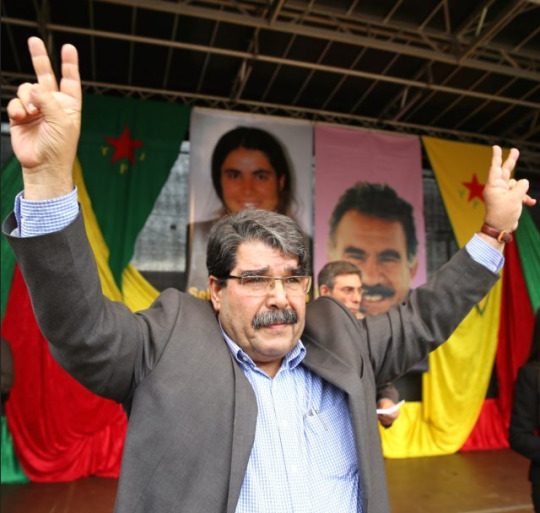
RELATED UPDATE: Syrian talks exclude Kurdish-led democratic opposition
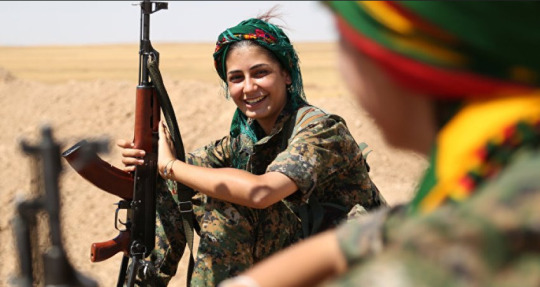
RELATED UPDATE: Rojava conference to discuss support for commune-style democracy

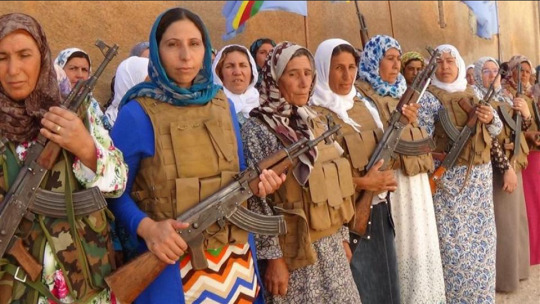
RELATED UPDATE: Inspiring call for solidarity with Kurdish freedom struggle
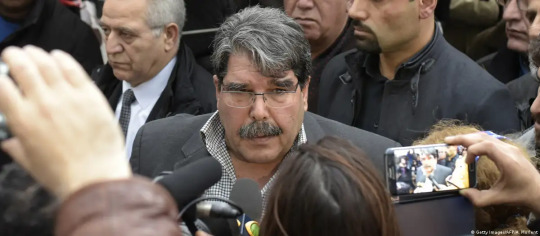
RELATED UPDATE: Syrian Kurdish leader Salih Muslim arrested in Prague
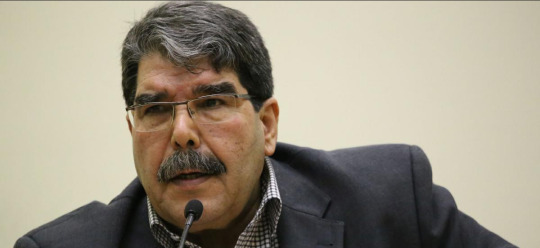
RELATED UPDATE: Former PYD co-chair Salih Muslim detained in Prague
https://ahvalnews.com/pyd/former-pyd-co-chair-salih-muslim-detained-prague

RELATED UPDATE: Syrian Kurdish leader Salih Muslim arrested in Prague on Turkey’s request

RELATED UPDATE: Release of Syrian Kurdish leader Saleh Muslim angers Turkey

RELATED UPDATE: Who Is Saleh Muslim? Turkey's Hunt for a Syrian-Kurdish Leader Spreads to the Heart of Europe
FURTHER READING:
#Kakistocracy#CorpMedia#Idiocracy#Oligarchs#MegaBanks vs#Union#Occupy#NoDAPL#BLM#SDF#DACA#MeToo#Humanity#DemExit#FeelTheBern#JinJiyanAzadi#BijiRojava
4 notes
·
View notes
Text
Three months ago, Hamas launched an unprecedented attack on Israel, which swiftly responded with an operation to eradicate the militant group. So far, around 1,200 Israelis and an estimated more than 23,000 Palestinians have died, with many more injured. Amid calls for a cease-fire, many observers are speculating what a “day after” might look like in the Gaza Strip.
Whether or not Hamas can be destroyed is a matter of considerable debate. Regardless, Israel and the United States—its most important ally—have insisted that the group can have no role in Gaza’s future administration. Instead, both have proposed the establishment of a multinational force that would include a role for Arab states—including those in the Persian Gulf. This means that Gaza could become a hot spot for geopolitical rivalries between Qatar, Saudi Arabia, and the United Arab Emirates.
Qatar is at the center of this conflict. Its capital, Doha, has hosted and financially bolstered Hamas’s political wing since 2012, when it relocated from Damascus—providing Gaza with much-needed humanitarian assistance. Qatar’s support for Hamas is part of a broader geopolitical strategy to back Islamist groups, particularly those associated with the Muslim Brotherhood, along with allies Iran and Turkey. This counterbalances Qatar’s regional rivals, Saudi Arabia and the UAE.
The small Gulf sheikhdom fashions itself something of a regional diplomat—and views diplomacy as a way to protect itself in a turbulent neighborhood. Since its traumatic 2017-to-2021 blockade, this has proved effective: Qatar moderated high-stakes talks like those between the United States and Taliban in 2020. It also secured the release of U.S. prisoners held in Iran in 2023.
The United States had previously requested that Qatar open a line of communication with Hamas in 2006 after the group’s legislative victory in the Palestinian territories, which preceded its 2007 takeover of Gaza and the Israeli blockade that followed. Since then, Doha—which does not have official relations with Israel—has actively mediated between Hamas and Israel on at least three occasions: in 2015, 2018, and 2021.
This time, Qatar is hoping to secure the release of remaining hostages held by Hamas—most of them Israeli—in exchange for a cease-fire or a humanitarian pause. From Nov. 24 to Dec. 1, 2023, ongoing talks resulted in the release of 110 hostages from Gaza and 240 Palestinian prisoners from Israel.
Qatar may go on to support nonmilitant members of the Muslim Brotherhood in Gaza after the war. (These could include members of Hamas’s political—rather than military—wing.) Doing so would satisfy U.S. and Israeli calls for Gaza to be rid of Hamas while also helping Doha to maintain its alliances with Turkey and, to a lesser extent, Iran—countering the influence of the UAE and Saudi Arabia.
Saudi Arabia has long competed with Iran for Islamic and regional leadership. Ever since the late Saudi King Abdullah launched what he called the Arab Peace Initiative in 2002, Riyadh has also supported the Arab-Israeli peace process. While Tehran—and Doha—financially and militarily back Hamas, Riyadh supports the Palestinian Authority (PA) and might wish to install the PA—which partially governs the West Bank—in postwar Gaza.
However, this could be difficult to implement. While U.S. President Joe Biden has expressed support for a post-Hamas Gaza under what he calls “a revitalized Palestinian Authority,” Israel remains opposed to any PA rule in the territory. What’s more, the PA, which many view as a proxy of Israeli occupation, is reviled by Palestinians—while Hamas’s popularity has soared. For PA rule in Gaza to be possible, Riyadh and Washington would need to do the difficult task of identifying a leader who is both accepted by Israel but also popular enough among Palestinians to dampen Hamas’s—and Iran’s—pull.
One potential candidate is former PA Prime Minister Salam Fayyad. Fayyad, a pragmatic leader, received support from the United States and Saudi Arabia during his tenure from 2007 to 2013. He also held talks with Hamas in 2021 in an unsuccessful attempt to form a national Palestinian unity government. In the past, Fayyad has suggested including Hamas under the umbrella of the Palestine Liberation Organization. While Fayyad has not commented publicly about the possibility of leading Gaza now, Saudi media reported in early January that his name has been mentioned by international diplomats in private discussions on the matter.
Before Oct. 7, Israel and Saudi Arabia had seemed to be moving toward normalization. The Biden administration had tentatively agreed to ambitious requests from Crown Prince Mohammed bin Salman, including a NATO-style security pact, access to advanced weaponry, and a civilian nuclear program. The crown prince told U.S. Secretary of State Antony Blinken last week that normalization was still in the cards after the war ends—provided that there is also a road map to Palestinian statehood.
Saudi leverage in normalization talks might unsettle the UAE. Though the two countries are ostensibly allies—especially opposite Qatar and the Muslim Brotherhood—they have stepped up their geopolitical competition in recent years in their respective quests to become the preeminent Gulf power. Both states have vied for regional dominance in the wars in Yemen and Sudan. The Arab-Israeli peace process in general—and discussions over Gaza’s future—could escalate this rivalry further.
Abu Dhabi seeks to wield a moderating influence on the war while safeguarding its own regional interests. In addition to condemning Israel’s attacks on Gazan hospitals, the UAE has been proactive in getting aid into the enclave, particularly at the United Nations. That is in part because the UAE, which balances relations between major powers such as Russia and the United States, has expansionist ambitions. In addition to Yemen and Sudan, Abu Dhabi also backs proxies in conflicts in the Horn of Africa and Libya.
The UAE’s 2020 normalization of relations with Israel was another such strategic move. Yet the country remains cautious of potential shifts in regional power dynamics, and particularly the prospect of Saudi-Israeli normalization. Emirati détente was, in part, an attempt to become the preeminent Arab power that can effect change on Palestine, wrestling that mantle away from Saudi Arabia. If Riyadh normalizes with Israel, it will be able to reclaim the Palestinian file.
Abu Dhabi may be considering Mohammed Dahlan to manage Gaza within the framework of Biden’s “revitalized” PA. Dahlan, a prominent former leader of the PA’s leading Fatah party and a native of Gaza, was once its security chief. However, Dahlan is now despised in Gaza because he spent years battling Hamas. In the eyes of many Gazans, he is no better than an Israeli occupier.
Dahlan has lived in exile in Abu Dhabi since 2011 after allegations of involvement in financial corruption and the assassination of Yasser Arafat, the leader of the Palestinian Liberation Organization. He is thought to have influenced and mediated Israeli-UAE normalization. Although the former Fatah leader has publicly rejected playing a role in a post-Hamas Gaza, Dahlan has also hinted that he is open to leading Palestinian politics in the future. This would bring strategic dividends for the UAE.
Dahlan maintains a strong relationship with Egypt, one of the two neighboring countries with official ties to Israel. The other is Jordan. Both must be included in any international diplomatic discussion over Gaza’s future—and could find themselves pulled into Gulf rivalries.
Jordan, which borders the West Bank and occupied the territory from 1948 to 1967, is home to a large Palestinian refugee population. Amman’s 1994 peace treaty with Israel recognizes the Hashemite monarchy’s custodianship of Islamic and Christian holy sites in Jerusalem—providing the country with an image of regional prestige, leadership, and religious significance. And in 1979, Egypt, the former occupier of Gaza, became the first Arab country to normalize ties with Israel. Ever since, it has aimed to balance its strategic relationship with Israel with popular support for the Palestinians and the need to maintain stability along its borders.
With most Gazans barred from Israel, Egypt’s Rafah border crossing is their main exit route. The border area also harbors Hamas’s smuggling tunnels. During this war, Cairo has helped control the Rafah crossing and shared intelligence with Israel, while President Abdel Fattah al-Sisi has attempted to position himself as a mediator by hosting an international summit. Jordan has similarly convened U.S. and Arab leaders.
But both countries suffer from vulnerabilities that could be exploited by Gulf powers eager to play a leading role in post-Hamas Gaza. They are much poorer than their Gulf counterparts, and their respective economies are in dire states—fueling popular anger even in repressive political environments.
Amman has received relief aid from Gulf Cooperation Council (GCC) nations since 2018 and has become especially dependent on support from the group due to COVID-19 pandemic-induced pressures. Egypt was struggling economically before the pandemic and the Russia-Ukraine war, but these crises—and their impact on food and fuel prices—have only made things worse. Sisi is under more scrutiny than ever.
In Egypt, Qatar could wield leverage by urging the government to ease pressure on the Muslim Brotherhood, which won Egypt’s first—and only—democratic election in 2012 and was subsequently labeled a terrorist organization after Sisi’s military took over in a 2013 coup. Riyadh and Abu Dhabi could exert sway Egypt to impact the wars in Sudan, Libya, and in Yemen.
Influence over Jordan would grant Gulf countries access to—and possible control over—the West Bank and East Jerusalem. National Defense University’s Michael Sharnoff argued in Foreign Policy in 2021 that Saudi Arabia wished to displace Jordan as the custodian of Jerusalem’s holy sites. Saudi Arabia’s demand to get this distinction would strengthen Riyadh’s hand in normalization talks with Israel and boost Riyadh’s image of being at the forefront of Islamic and Arab leadership—adding the Al-Aqsa Mosque (Islam’s third-holiest site) to the kingdom’s custodianship of Mecca and Medina (the first two).
Expanded Gulf influence over Jordan and Egypt could prove detrimental to Palestinians’ already fragile existence—and to the increasingly unrealistic two-state solution—by opening up new schisms in Palestinian society. It would also create a quagmire for the governments in Amman and Cairo. Being affiliated with a GCC state that helps displace Hamas in Gaza could bring much needed financial aid at the risk of alienating constituencies that are increasingly supportive of the militant group.
Intra-Gulf competition in Gaza has already begun. Among other actions, Qatar hosted three-way negotiations with the United States, Hamas, and Israel to allow for temporary pauses in fighting and provisions of humanitarian aid. Saudi Arabia was quick to bring forward its own initiatives, hosting a summit of major regional actors and Muslim-majority countries, such as Iran and Turkey, and announcing Chinese-brokered talks for ending the war. An Israeli start-up signed an agreement with the UAE to set up a land bridge to transfer goods from Dubai through Saudi Arabia and Jordan to Israel’s ports following a slate of Houthi attacks on Israeli cargo in the Red Sea.
Israel, the United States, and many Arab leaders are united in wanting to see Hamas’s demise. But in getting rid of one problem, others may arise. The Israel-Hamas war could intensify the growing rivalry among Gulf states—and one source of escalating regional tension may give way to another.
11 notes
·
View notes